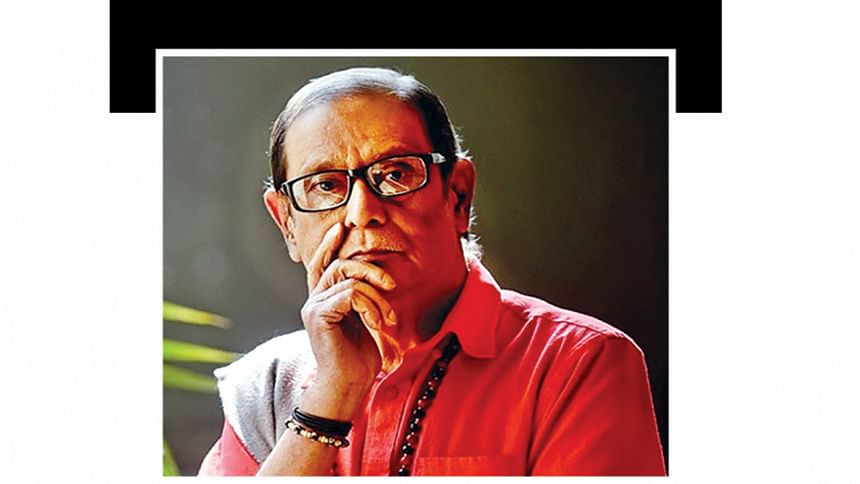The poet of love, rebellion falls silent

His words, woven with the fervour of rebellion and the tenderness of love, have left an indelible mark on the nation's literary landscape.
His debut collection, "Je Jole Agun Jole", ignited the hearts of thousands, and the first two lines of his poem "Nishiddho Sampadokio" became the anthem of resistance during all progressive movements starting from 1969 mass uprising, the Liberation War, and the anti-autocracy movements. His legacy is not just in the verses he penned, but in the spirit of defiance and hope he inspired in a generation.
The country mourned the loss of its cherished poet, Helal Hafiz, who breathed his last at the Bangabandhu Sheikh Mujib Medical University (BSMMU) around 2:30pm yesterday.
The poet, known as the poet of rebellion and love, was 76. Also a journalist, Helal Hafiz had long been suffering from glaucoma, diabetes, and kidney problems.
Jatiya Press Club General Secretary Ayub Bhuiyan confirmed the news saying that the poet suffered a fatal injury following a fall in the bathroom of Super Home Hostel in Shahbagh, Dhaka. The poet was taken to BSMMU, where he was pronounced dead, he added.
Chief Adviser Prof Muhammad Yunus expressed profound shock at his death.
In a condolence message, Prof Yunus said the death of Helal Hafiz is an irreparable loss to the Bangla language and literature.
He sought eternal peace of the departed soul and expressed deep sympathy to the bereaved family members.
The chief adviser said Helal Hafiz was the power of youth and a brave voice against dictatorship.
"Like his timeless poems, he will be remembered forever in the hearts of people," Prof Yunus added.
Cultural Affairs Adviser Mostofa Sarwar Farooki expressed deep shock and sorrow and conveyed profound sympathy to the bereaved family.
He said Helal Hafiz has made his place among the notable poets of Bangla language with only a few poems. The nation will always remember his contributions.
Helal Hafiz's first namaz-e-janaza will be held at Bangla Academy at 11:00am today, according to cultural affairs ministry.
He will be laid the eternal rest at Martyred Intellectuals' Graveyard in Mirpur after his second namaz-e-janaza after Zohr prayers at the Jatiya Press Club.
Born on October 7, 1948, in Netrakona, he finished his secondary education from Netrokona College. He eventually moved to the capital and finished his degree from Dhaka University where he studied Bangla literature.
Author of many notable works of poetry, Helal Hafiz published three poetry collections in his lifetime.
His debut poetry collection, published in 1986, earned him the "bestseller" title at the Ekushey Boi Mela that year, outshining several well-established authors of the time. It created a massive stir upon its release with its blend of political language and emotion, bringing him immense fame.
Since then, the poet had become a well-loved name among poetry enthusiasts as well as literateurs.
The book has been reprinted over 33 times legally since its publication.
His poetry encapsulates themes of love, grief, struggle, and movements that transcend time and age, and readers will continue to find them resonant no matter the prevalent socio-political climate.
Although Helal Hafiz hardly associated himself with decisive political viewpoints, his poem "Nishiddho Shampadokiyo" became one of his most quoted poems during egalitarian movements.
The first two lines of this poem -- "Ekhon joubon jar, michhile jabar tar shreshtho shomoy; Ekhon joubon jar, juddhe jabar tar shreshtho shomoy" ("Those in their youth, now is the best time to march in the protests; Those in their youth, now is the best time to march into battle") -- became political slogans.
To this day, it remains one of the most widely used political slogan in Bangladesh.
In an interview, Helal Hafiz himself once mentioned that no newspaper dared to publish the poem at the time. However, the first two lines of the poem were inscribed on the walls of Dhaka University one night in 1969 by Ahmad Sofa and poet Humayun Kabir.
Following this, Helal Hafiz achieved star-like fame as a poet during his student years.
Besides writing poetry, he also served as the literary editor of several newspapers and was a member of Jatiya Press Club. Helal Hafiz received the Bangla Academy award for poetry in 2014.
His most recent work, Bedonake Bolechhi Kedo Na, was published in 2019.

 For all latest news, follow The Daily Star's Google News channel.
For all latest news, follow The Daily Star's Google News channel. 



Comments